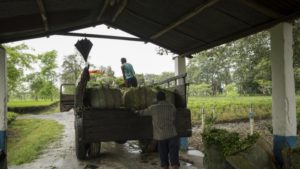Barak UpdatesBusinessBreaking News
Tea Industry: A Planter’s Perspective- Part II- ‘Tea Estates – Work Culture’

Tea Estates – Work Culture
November 30: The British had left a legacy of punctuality and work ethics in the tea industry for all stakeholders to follow and manage huge properties. They also left a culture, which the planters/owners, staff & labourers followed till the early 1970’s. Thereafter, this started to wane as most of the properties were sold to individual owners. Inflation was playing its part. The change started showing as economics/ profitability was under pressure. Although, we were yet to reach a stage of self sufficiency of tea in the country, margins were low as in those times MRTP Act was enforced whenever the prices surged. Pressure started building up which prompted cost cutting under various heads for both good and bad. The good part was unnecessary lavishness with which the managers lived and the bad part was that it affected the working of the estates, albeit slowly.
 Attendance and work distribution at the morning assembly which we call ‘GUNTY’ was prompt and on time. The situation has drastically changed over time when labour would intentionally report late for work and loiter to join duties. They have even resorted to pick and choose the work they wish to do although it is mandatory to take up any and every duty which the management gives to them. If not given their choice, they refuse to work and proceed to work outside the estate even though they have to work longer hours there. This is unethical and unlawful on their part as they have been given houses as an incidence to employment to work in the tea estate. An interesting feature which all the estates especially in Cachar face is ‘less work full pay’ syndrome. This is more an issue with the Men force who would work 3 to 4 hours at the most and demand full day hazree. This has led all the gardens to a situation where cost of very essential cultivation works, annual pruning & maintenance works like drain cleaning/repairs etc has spiraled beyond control.
Attendance and work distribution at the morning assembly which we call ‘GUNTY’ was prompt and on time. The situation has drastically changed over time when labour would intentionally report late for work and loiter to join duties. They have even resorted to pick and choose the work they wish to do although it is mandatory to take up any and every duty which the management gives to them. If not given their choice, they refuse to work and proceed to work outside the estate even though they have to work longer hours there. This is unethical and unlawful on their part as they have been given houses as an incidence to employment to work in the tea estate. An interesting feature which all the estates especially in Cachar face is ‘less work full pay’ syndrome. This is more an issue with the Men force who would work 3 to 4 hours at the most and demand full day hazree. This has led all the gardens to a situation where cost of very essential cultivation works, annual pruning & maintenance works like drain cleaning/repairs etc has spiraled beyond control.

To manage the labour better and get the maximum work out of them, the industry in consultation with unions and other stake holders had devised task for each operation required to be done in the field. These have been finalized long time ago. With increase in wages from Rs 38/- in 2002 to Rs 145/- as of today the task has remained the same, save and except for plucking which was increased very reluctantly in 2013/14 from 18 kgs to 23 kgs per hazree. This has put exceptional additional pressure on the cost & cash flows which is already strained due to massive increase in wages, essential inputs, transportation and low sale realization.
 Quality of work has deteriorated rather sharply. Certain operations which need to be done in the field annually are not being undertaken due to a) cost factor & b) nonavailability of workers/massive absenteeism which almost all the tea estates are facing for the past 7 to 8 years and may be more in certain gardens. Brief causes for such a situation is a) MNREGA b) Higher wages in towns nearby c) Flight of young boys/men to larger cities such as Bangalore, New Delhi, Pune & D) easy micro/small loans provided by micro financing banks/private institutions such as Bandhan Bank and other such lenders is a deterrent to a part of the work force from working in the gardens as the weekly payment to such lenders drives them to such a situation that to meet ends with the wages earned becomes an uphill task for them.
Quality of work has deteriorated rather sharply. Certain operations which need to be done in the field annually are not being undertaken due to a) cost factor & b) nonavailability of workers/massive absenteeism which almost all the tea estates are facing for the past 7 to 8 years and may be more in certain gardens. Brief causes for such a situation is a) MNREGA b) Higher wages in towns nearby c) Flight of young boys/men to larger cities such as Bangalore, New Delhi, Pune & D) easy micro/small loans provided by micro financing banks/private institutions such as Bandhan Bank and other such lenders is a deterrent to a part of the work force from working in the gardens as the weekly payment to such lenders drives them to such a situation that to meet ends with the wages earned becomes an uphill task for them.
 Unknowingly, they fall into a debt trap from which recovery is a problem. PF/casual advance applications rise every week as those who take loans need to repay every week on a fixed day & time. The illiterate worker finds himself in such a mess that if it had not been for the near free ration supplied under the P L Act by the management and also under the Food Security Act these poor workers would find it difficult to feed themselves.
Unknowingly, they fall into a debt trap from which recovery is a problem. PF/casual advance applications rise every week as those who take loans need to repay every week on a fixed day & time. The illiterate worker finds himself in such a mess that if it had not been for the near free ration supplied under the P L Act by the management and also under the Food Security Act these poor workers would find it difficult to feed themselves.
 A number of gardens try to fulfill their requirement of labour by engaging them from other estates. How does one survive as cost of such labour is prohibitive since they entail transportation, commission to the middleman & sometimes compromising on quality & task driving cost upwards.
A number of gardens try to fulfill their requirement of labour by engaging them from other estates. How does one survive as cost of such labour is prohibitive since they entail transportation, commission to the middleman & sometimes compromising on quality & task driving cost upwards.
 “I have been always very optimistic in life but for this time I am not hopeful of the economic model of tea industry unless a VERY SERIOUS thought is put in place to see that the industry doesn’t fold up and we become a net importer of tea to feed our millions,” laments a planter associated with the gardens of Barak Valley since almost two decades.
“I have been always very optimistic in life but for this time I am not hopeful of the economic model of tea industry unless a VERY SERIOUS thought is put in place to see that the industry doesn’t fold up and we become a net importer of tea to feed our millions,” laments a planter associated with the gardens of Barak Valley since almost two decades.
Also Read: Tea Industry: A Planter’s Perspective- Part 1- ‘Politics & Tea Industry’
To be continued…….3





